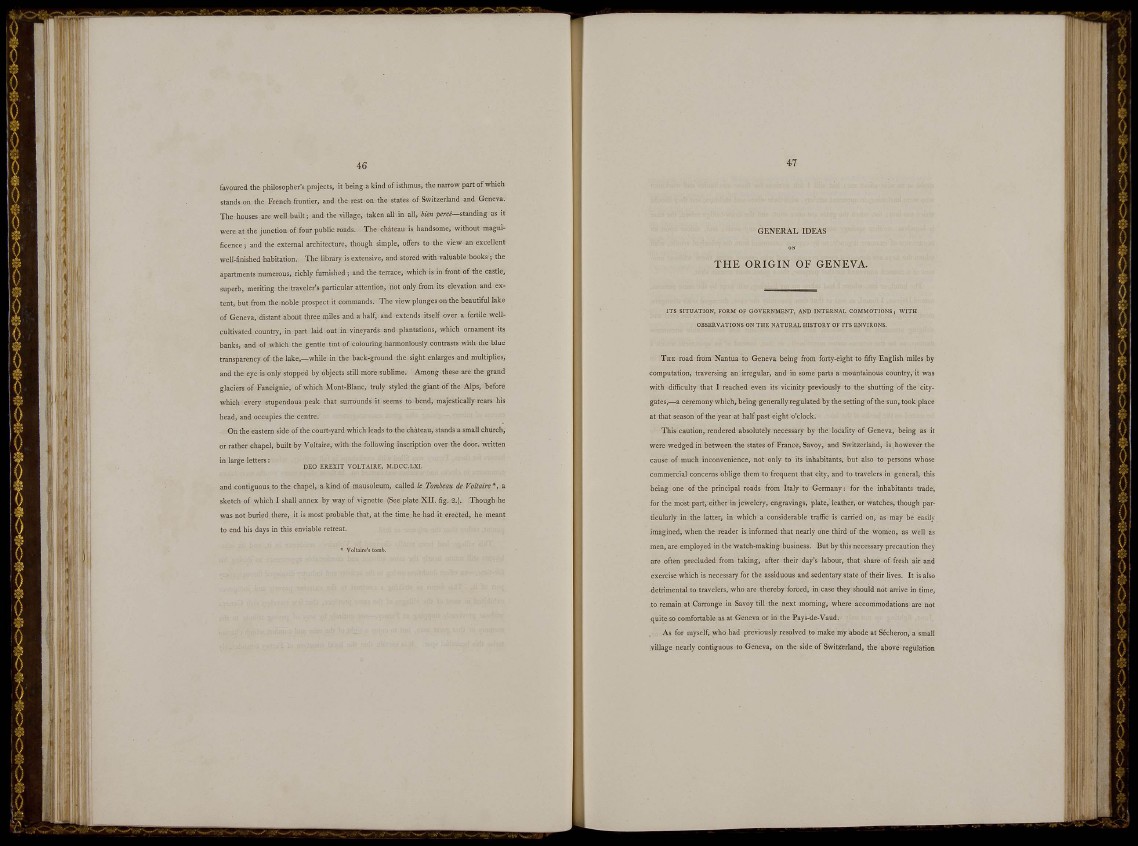
q
F' fîi'l i
46
favoured the philosopher's projects, it being a kind of isthmus, the narrow part of which
stands on the French frontier, and the rest on the states of Switzerland and Geneva.
The houses are well built ; and the village, taken all in all, bien percé—standing as it
were at the junction of four public roads. The château is handsome, without magnificence
} and the external architecture, though simple, offers to the view an excellent
weli-finished habitation. The library is extensive, and stored with valuable books ; the
apartments numerous, richly fiarnished ; and the terrace, which is in front of the castle,
superb, meriting the traveler's particular attention, not only from its elevation and extent,
but from the noble prospect it commands. The view plunges on the beautiful lake
of Geneva, distant about three miles and a half, and extends itself over a fertile wellcultivated
country, in part laid out in vineyards and plantations, which ornament its
banks, and of which the gentle tint of colouring harmoniously contrasts with the blue
transparency of the lake,—while in the back-ground the sight enlarges and multiplies,
and the eye is only stopped by objects still more sublime. Among these are the grand
glaciers of Fancignie, of which Mont-Blanc, truly styled the giant of the Alps, before
which every stupendous peak that surrounds it seems to bend, majestically rears his
head, and occupies the centre.
On the eastern side of the court-yard which leads to the château, stands a small church,
or rather chapel, built by Voltaire, with the following inscription over the door, written
in large letters :
DEO EREXIT VOLTAIRE, M.DCC.LXI.
and contiguous to the chapel, a kind of mausoleum, called le Tombeau de Voltaire*, a
sketch of which I shall annex by way of vignette (See plate XII. fig. 3.). Though he
was not buried there, it is most probable that, at the time he had it erected, he meant
to end his days in this enviable retreat.
47
GENERAL IDEAS
THE ORIGIN OF GENEVA.
ITS SITUATION, FORM OF GOVERNMENT, AND INTERNAL COMMOTIONS; WITH
OBSERVATIONS ON THE NATURAL HISTORY OF ITS ENVIRONS.
THE road from Nantua to Geneva being from forty-eight to fifty English miles by
computation, traversing an irregular, and in some parts a mountainous country, it was
with difficulty that I reached even its vicinity previously to the shutting of the citygates,—
a ceremony which, being generally regulated by the setting of the sun, took place
at that season of the year at half past eight o'clock.
This caution, rendered absolutely necessary by the locality of Geneva, being as it
were wedged in between the states of France, Savoy, and Switzerland, is however the
cause of much inconvenience, not only to its inhabitants, but also to persons whose
commercial concerns oblige them to frequent that city, and to travelers in general, this
being one of the principal roads from Italy to Germany: for the inhabitants trade,
for the most part, either in jewelery, engravings, plate, leather, or watches, though particularly
in the latter, in which a considerable traffic is carried on, as may be easily
imagined, when the reader is informed that nearly one third of tlie women, as well as
men, are employed in the watch-making business. But by this necessary precaution they
are often precluded from taking, after their day's labour, that share of fresh air and
exercise which is necessary for the assiduous and sedentary state of their lives. It is also
detrimental to travelers, who are thereby forced, in case they should not arrive in time,
to remain at Carronge in Savoy till the next morning, where accommodations are not
quite so comfortable as at Geneva or in the Pays-de-Vaud.
As for myself, who had previously resolved to make my abode at Secheron, a small
village nearly contiguous to Geneva, on the side of Switzerland, the above regulation